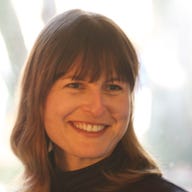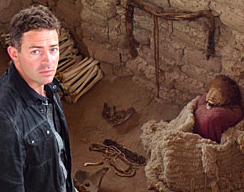Discovery's Olly Steeds asks the tough questions


Olly Steedsis on a mission to solve some of the world’s biggest mysteries. In his Discovery Channel show, Solving History with Olly Steeds, the 34-year-old British investigative journalist has immersed himself in some pretty dicey situations to get the story--from getting lost in a Jordanian desert to driving around Red Square in a borrowed limo pretending to be James Bond to being arrested and imprisoned in Mongolia. I talked to him last week when he was having a quiet day in London.
Were you the kid who asked uncomfortable questions?
I’ve always questioned things. One of my memories as a kid was when I was learning about gravity, and I thought, “I better test this out.” So I climbed a tree with a brick. I don’t remember much of what happened next, but I went home to my poor mother with a big hole in my head. My mother always said it’s important to try things and make mistakes. She called on Jack in the Beanstalk and Cinderella, saying, what would have happened if Jack hadn’t climbed the beanstalk and Cinderella hadn’t gone to the ball? I’m all about making mistakes.
You’ve spent a lot of time living with tribes, including one that practices cannibalism. What have you learned?
Where do you start? On a personal level—its’ so easy to take things for granted in our world—to complain about this and that. The indigenous people have no place for moaning and complaining; they just get on with it. They have an incredible generosity of spirit, which makes sense in that world--you have to be kind to your neighbor in case you ever need him. So it’s the kindness, generosity, hospitality, the need to look after your neighbor, the notions of community--it’s easier to see in their world because in some capacity they have a simpler life, compared to our modern world and the great sort of complexity we like to surround ourselves with.
Where do your questions come from?
From looking at some of the most iconic mysteries—stories that have captured our minds for generations. I wanted to get to the bottom of it: Is there anything substantial to this? What happened to Atlantis? Was there really an Ark of the Covenant? I wanted to look for stories that enable us to answer these questions, so history wouldn’t become dry and boring and dull, like some of the history teachers I’ve had. And I want to know what it really feels like to do some of these things, so I experience it myself--like solitary confinement at Devil’s Island, which makes Alcatraz look like summer camp.
How is this work as world-traveler, mystery-solver similar to work as an investigative journalist?
It’s all an adventurous journey. It’s about going out in the world and trying to understand what’s really there. Having an inquisitive mind, asking tough questions, not being afraid to challenge people, trying to get to the bottom of things. The difference between this series and investigative journalism is that here, I inject myself in the story and have my opinion.
Have you found much relevance to modern times in these historical questions?
Everything. For example, El Dorado, Lost City of Gold. The Conquistadors were originally motivated by gold. They stole so much gold, and there was so much destruction of the Andean people. And these things are still going on. History is repeating itself.
This post was originally published on Smartplanet.com